| Srl | Item |
| 1 |
ID:
118782
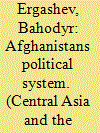

|
|
|
| 2 |
ID:
152865
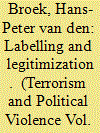

|
|
|
|
|
| Summary/Abstract |
This article focuses on the role of labelling in the discourse employed by the Left-Wing Nationalist movement in the Basque Country to legitimize the use of violence for political ends. The approach in this article goes beyond classic labelling theory. I demonstrate that radical Nationalists do not passively undergo their being labelled as deviants (fanatics, terrorists) by society, but develop counter-labels instead to define their opponents and re-label themselves.
|
|
|
|
|
|
|
|
|
|
|
|
|
|
|
|
| 3 |
ID:
155688
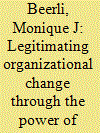

|
|
|
|
|
| Summary/Abstract |
While humanitarian work has always implied a certain level of risk, in the last two decades there has been a growing concern that humanitarian and peacekeeping agents are exposed to unprecedented levels of insecurity. To determine whether or not such claims and perceptions are substantiated, researchers have developed quantitative datasets aimed at measuring and tracking threats to humanitarians and peacekeepers at the global level. In contrast to humanitarian practitioners which use such quantitative expertise to suggest aid work is becoming increasingly dangerous, the producers of quantitative representations of humanitarian security suggest instead that attack rates have remained for the most part fairly stable despite increases in absolute numbers. In order to make sense of this paradox, this article draws on neo-Bourdieusian approaches, the sociology of professions and organizations, as well as global governance literature on quantification to suggest that such inconsistencies relate to the use of quantitative data to legitimate organizational change and bureaucratic restructurations in relation to the institutionalization of security expertise. By understanding the dynamics of organizational change, this article sheds light on one of the ways through which international humanitarianism and peacekeeping is shifting from a paradigm of proximity to a paradigm of distance and remoteness.
|
|
|
|
|
|
|
|
|
|
|
|
|
|
|
|
| 4 |
ID:
179885
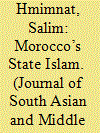

|
|
|
| 5 |
ID:
137646
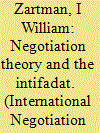

|
|
|
|
|
| Summary/Abstract |
The evolution of the Arab Spring in eight countries is primarily a matter of negotiation. The instances can be broken down into Short Track (Tunisia, Egypt) and Long Track (Syria, Libya, Yemen) Transitions and Short Track (Algeria, Morocco, Bahrain) Reactions. They bring a number of lessons for negotiation analysis, primarily on scope and power, and their deviation from an ideal type model can be explained by the predominance of distributive over integrative negotiation and the imposition of a three-dimensional scene for negotiation and legitimization, with an Islamic dimension overlaying the usual left-right spectrum.
|
|
|
|
|
|
|
|
|
|
|
|
|
|
|
|
| 6 |
ID:
173946
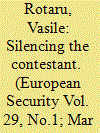

|
|
|
|
|
| Summary/Abstract |
This article analyses Russia’s endeavours in legitimising the annexation of Crimea in the eyes of the Western community. The paper argues that Russia’s strategy of “silencing” the international contestation has been focused on the use of the West’s “language” for the justification of contested actions. Starting from the assertion that the formulation of Russia’s foreign policy is determined by Western normative frameworks and by the West’s international behaviour, the article scrutinised Moscow’s official narrative after March 2014 by comparing it with the West’s arguments used in particular in the cases of NATO’s intervention in Yugoslavia and the recognition of Kosovo’s independence.
|
|
|
|
|
|
|
|
|
|
|
|
|
|
|
|
| 7 |
ID:
185922
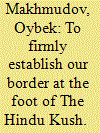

|
|
|
|
|
| Summary/Abstract |
Expansion has been a trait typical of many empires. As they occupied new territories, empires needed to exert control over them, and for this they needed roads. New roads also served to indirectly legitimize imperial rule over subjugated lands, in the eyes of both the local population and other, competing colonial powers. The Russian Empire was no exception, especially in such remote, mountainous regions as Pamir. As soon as Russian rule had been established, the Russian authorities faced the challenge here of ‘developing’ the road network. Roadbuilding, initiated by the Russians, brought the technological advances of the West to the peoples living in the Pamir Mountains, and accelerated their integration with the rest of the empire, whilst simultaneously legitimizing Russian rule at a local level. Traditional, local trails and Russian-built roads merged into a single network, an imperial mix of communication lines that allowed the Russians to successfully control Pamir.
|
|
|
|
|
|
|
|
|
|
|
|
|
|
|
|